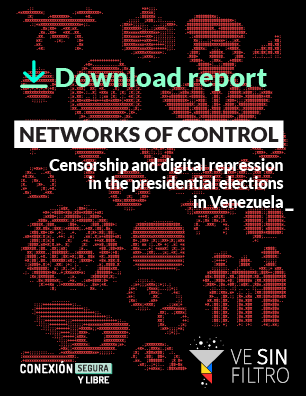Special report: Censorship and digital repression in the presidential elections in Venezuela

During Venezuela’s electoral period—from the start of the campaign on July 4, 2024, through election day on July 28, and extending to the inauguration on January 10, 2025—the country experienced an unprecedented wave of digital censorship. During this period, we documented a total of 79 blocked websites and DNS servers. Prior to that date, in 2024, five additional sites—mainly media outlets—had already been blocked.
From July 4, 2024, to January 31, 2025, new blocks primarily targeted censorship circumvention tools; public DNS servers; media outlets; websites belonging to civil society organizations and human rights groups; social media platforms; and websites containing political content critical of the government, particularly those sharing election results based on tally sheets collected by the Venezuelan opposition.
On the other hand, VE sin Filtro documented and archived 270 cases that demonstrate repressive practices and the use of technology to persecute dissidents, distributed across two phases of the political crisis. The first occurred after the election, covering the period from July 28 to early November. The second took place between December 2024 and January 10, 2025, with the resumption of repression ahead of Nicolás Maduro’s swearing-in.
Some of the documented practices include doxxing of opposition volunteers and protesters through official channels and pro-government accounts, with the aim of harassing them or gathering information that could lead to their arrest. Government officials also openly encouraged citizens to report neighbors they believed were involved in subversive activities. The report also documents cyberattacks against dissidents and an opposition party, as well as the use of frones and other survellance practices against protesters and disidients.
Read our special report:
Networks of Control: Digital Censorship and Repression During Venezuela’s Presidential Elections
